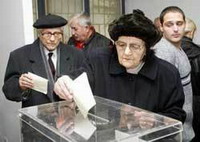Bizarre contradictions accompany Swiss elections
Swiss elections revealed some of the bizarre contradictions in this Alpine nation that takes pride in being a cradle of humanitarian work, yet whose famed neutrality is often a mask for stubborn insularity.

The success of a nationalist party whose campaign posters showed white sheep kicking out a black sheep transcended the usual cultural divide between the serious-minded Germanic north and the more easygoing French and Italian south.
But with Greens also making dramatic gains, the results raised an eternal question: What does it mean to be Swiss?
There's never an easy answer in a tiny nation of 7.5 million people that has no less than four national languages: French, German, Italian and Romansch - an obscure cousin of Latin that is spoken by about 35,000 people, mainly in the valleys of eastern Switzerland.
But the tensions go beyond questions of linguistics.
The rightwing Swiss People's Party, which campaigned on a promise to kick out entire immigrant families if one member of the family broke the law, made advances not only in the socially conservative north but among French and Italian speakers as well.
In fact, commentators made much of how the SPP managed to breach the "roesti divide" - named for the hashed-brown potato dish which German speakers enjoy and which is largely shunned by French speakers who prefer a more Mediterranean diet.
But along with this increasingly xenophobic Switzerland is the Switzerland that welcomes foreigners - from the millions of tourists who pass through each year to refugees from the Balkan conflicts. Since last year, nationals from most EU nations have been able to enter Switzerland without a passport thanks the resounding Swiss "Yes" in a referendum on joining the border-free "Schengen Zone."
Then there are Switzerland's hallowed traditions of commitment to humanitarian values.
The Red Cross was founded by a Swiss businessman who established the institution after witnessing battlefield carnage in Italy. Key U.N. agencies - including the United Nations High Commissioner for Refugees - are based in Geneva.
And the Swiss are surprisingly easygoing about all of the languages in their midst: German-speakers from the business center Zurich immediately switch to French once they set foot in Geneva and many Genevois return the compliment in German whenever they visit Zurich.
The Green Party, while still small, turned in its best showing yet, raising to 20 its share of the 200-seat lower house of parliament, reflecting concerns for the environment on the left and putting the party nearly close enough to ask for a seat in the Cabinet.
All of this comes with a distinctly conservative streak.
While the nation prides itself on its unique system of direct democracy, which gives voters veto power over the government in frequent referendums, it only gave women the vote in 1971.
Immigration has long been a concern of the Swiss _ and back in World War II, the claim "the boat is full" was used as an excuse to curb rescues of people fleeing the Nazis.
Although the Swiss accepted 27,000 Jews, they turned their back on 30,000 most likely to suffer death at the hands of the Germans.
It's also confoundingly difficult to gain Swiss citizenship.
Applicants typically must wait years and clear administrative hurdles before they are granted Swiss passports, and many of those workers and refugees are still among 1.6 million foreigners in Switzerland's population.
The Swiss People's Party broke a record by gaining 29 percent of the vote in Sunday's parliamentary elections, the highest any party has achieved since the current parliamentary system began immediately after World War I.
Not that everyone in the French-speaking part welcomed the party's success. The Lausanne daily 24 heures compared the People's Party to the "bise," the cold north wind.
"The SPP bise is blowing over all of Switzerland," said the newspaper's front-page headline.
Subscribe to Pravda.Ru Telegram channel, Facebook, RSS!


